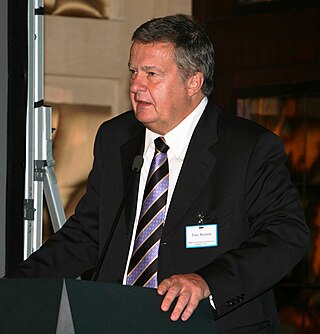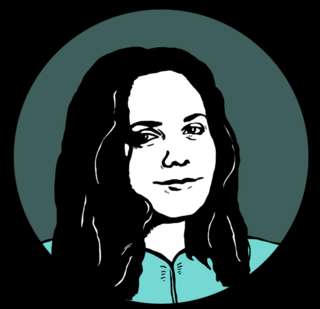
A journalist is a person who gathers information in the form of text, audio or pictures, processes it into a newsworthy form and disseminates it to the public. This is called journalism.

Anita McNaught is a British journalist, television correspondent and former presenter, based in Istanbul in Turkey. Previously, she worked for Al Jazeera English for 5½ years, as a roving Middle East correspondent.

Sami Mohy El Din Muhammed Al Hajj, aka Sami Al-Haj is a Sudanese journalist for the Al Jazeera network. In 2001, while on his way to do camera work for the network in Afghanistan, he was arrested by the Pakistani army and held in the United States Guantanamo Bay detainment camp in Cuba for over six years. After his release, al-Hajj wrote a book titled Prisoner 345. He was released without charge on May 1, 2008. He later attempted to launch legal action against George W. Bush.

Tony Burman is a Canadian broadcaster, journalist and university official. Starting in the 1960s, Burman has worked as a journalist, in print, radio, television, and online. For most of this time, he was at the Canadian Broadcasting Corporation. Later he joined Al Jazeera English. He is also active in supporting public broadcasting and investigative journalism.

Michelle Shephard is an independent investigative reporter, author and filmmaker. She has been awarded the Michener Award for public service journalism and won Canada's top newspaper prize, the National Newspaper Award, three times. In 2011, she was an associate producer on a documentary called Under Fire: Journalists in Combat. She produced the National Film Board documentary, Prisoners of the Absurd, which premiered at Amsterdam's film festival in 2014. Shephard also co-directed a film based on her book about Omar Khadr, Guantanamo's Child, which premiered at the Toronto International Film Festival in September 2015.
Mellissa Veronica Fung is a Canadian journalist with CBC News, appearing regularly as a field correspondent on The National.

Roxana Saberi is an American journalist who works as a correspondent for CBS News. In 2009, she was held prisoner in Iran's Evin Prison for 101 days under accusations of espionage. She subsequently wrote a book about the experience.

Eman al-Nafjan is a Saudi Arabian blogger and women's rights activist. She was detained by Saudi authorities in May 2018 along with Loujain al-Hathloul and five other women's rights activists in what Human Rights Watch interpreted as an attempt to frighten her and the other activists, during the 2018–2019 Saudi crackdown on feminists.

Since the start of the Syrian Civil War, all sides have used social media to try to discredit their opponents by using negative terms such as 'Syrian regime' for the government, 'armed gangs/terrorists' for the rebels, 'Syrian government/US State Department propaganda', 'biased', 'US/Western/foreign involvement'. According to the Stockholm International Peace Research Institute, given the complexity of the Syrian conflict, media bias in reporting remains a key challenge, plaguing the collection of useful data and misinforming researchers and policymakers regarding the actual events taking place.

Hamza Ali Al-Khateeb was a 13-year-old Syrian boy who died while in the custody of the Syrian government in Daraa. On April 29, 2011, he was detained during a protest. On May 25, 2011, his body was delivered to his family, having been badly bruised, along with burn marks, three gunshot wounds, and severed genitals. Hamza's family distributed photos and video of his body to journalists and activists. Shocked by what was depicted, thousands of people showed their support for Hamza online and in street protests.
Kouhyar Goudarzi is an Iranian human rights activist, journalist and blogger who was imprisoned several times by the government of Iran. He previously served as an editor of Radio Zamane. He is a member of Committee of Human Rights Reporters (CHRR), serving as the head from 2005-2009.
This article details the Syrian government's response to protests and civilian uprisings of the Syrian revolution which began in early 2011, that unravelled the socio-political stability of Syria, eventually plunging the country into a nationwide civil war by mid-2012.

The Abdiaziz Abdinur Ibrahim controversy began in February 2013 when journalist Abdiaziz Abdinur Ibrahim interviewed Lul Ali Osman, who claimed that she was raped by government security forces while living in an internally displaced peoples camp in Mogadishu, Somalia. The two were arrested, tried, and sentenced to a year in prison for having allegedly fabricated the story. The trial was described by some human rights groups as politically motivated. Osman was later in the month acquitted following an appeal, and Ibrahim's sentence was reduced to six months. It was concurrently announced that an Independent Task Force on Human Rights had been established, which would review his case to see if due process has been followed. Ibrahim was released from detention the following month, on 17 March 2013.
Al Jazeera Arabic is a flagship news channel that primarily caters to an Arabic-speaking audience. Al Jazeera English, launched in 2006, is the English-language counterpart to Al Jazeera Arabic. According to Al Jazeera, Al Jazeera Arabic is editorially independent from Al Jazeera English, although it shares the same editorial vision. It is based in Doha and operated by the Al Jazeera Media Network.
Ali Mahmoud Othman is a Syrian citizen journalist and activist from Homs. He is nicknamed the "Eyes of Baba Amr" and "Jeddo" (Grandfather).

Jason Rezaian is an Iranian-American journalist who served as Tehran bureau chief for The Washington Post. He was convicted of espionage in a closed-door trial in Iran in 2015.

Mohamed Fadel Fahmy is an Egyptian-born Canadian journalist, war correspondent and author. He has worked extensively in the Middle East, North Africa, for CNN, BBC and Al Jazeera English.
Bushra al-Tawil or Bushra al-Taweel is a Palestinian journalist, former Palestinian prisoner and prisoners' rights activist from Ramallah who has frequently been held under administrative detention without charge by Israel. She is the spokesperson for the Aneen Al-Qaid Media Network, a local news agency specialized in covering news about the Palestinian detainees, and political prisoners.
On April 17, 2021, Rozina Islam, a senior female reporter of the Bangladeshi daily Prothom Alo, went to the Health Ministry office in the Bangladesh Secretariat for COVID-19 related reporting. She was confined in the ministry for five hours and her cell phones were seized. She was allegedly harassed and assaulted during her detention at the secretariat. She was then arrested from the Ministry for alleged theft and taking photographs of sensitive state documents. Sibbir Ahmed Osmani, Deputy Secretary of the Health Services Division, filed a case against her around midnight of April 17, 2021 with Shahbagh police station under the Official Secrets Act. She was jailed in Dhaka Kashimpur Women's Central Jail amid widespread protests. A virtual hearing for her bail was held on May 20, 2021, later the court announced the decision would be delayed to May 23, 2021, and on that day she was granted a conditional bail after being imprisoned for 7 days.